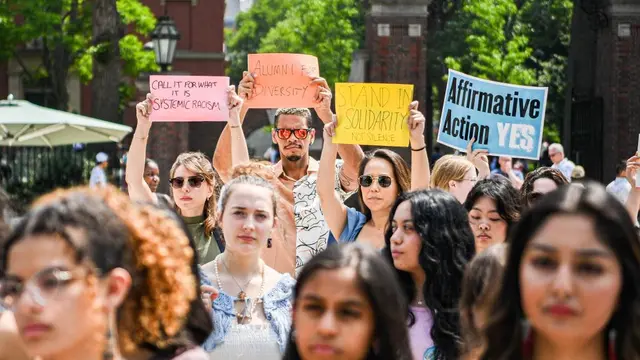This week, the U.S. Supreme Court rejected affirmative action that grants disadvantaged students of color admission in colleges and universities, particularly University of South Carolina and Harvard University. The court proposed this ruling based on the equal protection clause of the Fourteenth Amendment of the U.S. Constitution, which grants all American citizens equal protection.
This landmark decision will drastically affect enrollment of students who come from culturally diverse backgrounds with hard-hitting challenges in the American education system that disfavor them over white students.
While experts may argue that the U.S. Supreme Court's decision aligns with the equal protection clause, overturning affirmative action that was originally designed to support marginalized groups of color violates the clause, too. Striking down affirmative action by no means ensures that black Americans, Hispanics, Latinos, Muslims or any other minority group would have an equal shot at securing college admissions. Affirmative action was a safety net for these groups and a key solution to addressing lack of diversity in education.
In a day and age where affluent, white families can afford to enroll their children in top U.S. schools, the same cannot be said about African-American or Hispanic households. There is already significant income inequality in terms of what white, non-Hispanic families earn compared to black and Latino households. Business Insider reported last year that White, non-Hispanic families had a median net worth of $188,200 compared to blacks with $24,100 and Latinos with $36,200. The discrepancy in figures screams income inequality.
In fact, the problem with the U.S. education system is white Americans who influence the admission process. In the recent past, Hollywood actors Felicity Huffman and Lori Loughlin exercised their power and fame to illegally secure admissions for their children in top American universities. A majority of U.S. adults, including white Americans also felt that race should not be a deciding factor in securing admissions, according to the 2022 Washington Post-Schar School poll.
In a way, the Supreme Court's decision validates the history of racial discrimination in the United States that has constantly suppressed minority voices in voting, leadership, employment and education. Enacting affirmative action was a way of enabling marginalized, historically oppressed groups to be on a level playing field as white Americans. Affirmative action never favored one group over the other. It only ensured that oppressed segments of the population were seen in the American education system.
Clarence Thomas, a black conservative Supreme Court Justice, also ruled against affirmative action. He is a conservative justice who has a history of political scandals resting on his shoulders. In 1991, Anita Hill, a lawyer, accused Clarence Thomas of sexual harassment while she was working under him at the United States Department of Education and Equal Employment Opportunity Commission. For decades, Thomas has partaken in lavish vacations funded by a Republican billionaire, Harlan Crow. He has received a hefty income from a family real estate company, which has been defunct since 2006.
These allegations put Clarence Thomas in no position to defend the constitution at the expense of marginalized groups considering his personal legal battles. It is surprising enough that he retains his position as Supreme Court justice despite a series of scandals.
The affirmative action ruling has created further political divides, pitting liberals and conservative Americans against each other. While the ruling may be a clear win for the Republican Party, education itself should never be politicized, particularly when underrepresented groups are involved. Unless overturned again to favor minority groups, this racist ruling may cause every school and college to omit diversity while considering applications for admission.
The ruling will subconsciously grant permission to elite, more influential people to exercise their power on minority groups, resulting in increased racial violence on campuses. Minority groups across the U.S. already struggle to prove their merits in both academic and workplace settings. The latest U.S. Supreme Court ruling rescinds decades of progress in American education to further deprive racial groups their right to equal opportunity in education.
(CGTN)
 简体中文
简体中文

